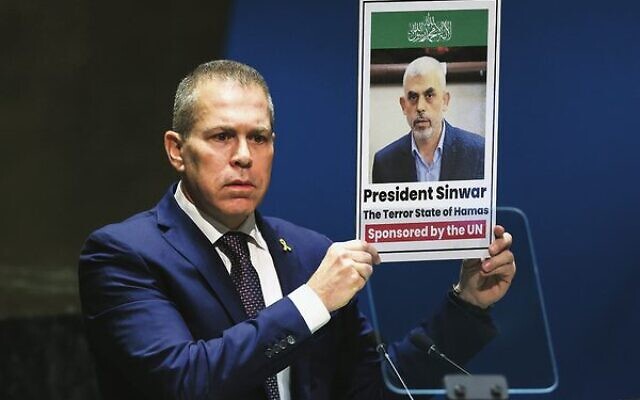Jewish groups condemn Labor
Writing in this week's AJN, Wong told the Jewish community, "We see no role for Hamas ... A Palestinian state cannot be in a position to threaten Israel's security."

Foreign Minister Penny Wong said this week that Australia’s vote for a UN General Assembly resolution that boosts the status of the Palestinians at the United Nations aims to shore up efforts for a two-state solution that would see a reformed Palestinian Authority that disavows violence.
Writing in this week’s AJN, Wong told the Jewish community, “We see no role for Hamas … A Palestinian state cannot be in a position to threaten Israel’s security.”
Australia joined 142 other nations last Friday in a non-binding vote calling on the Palestinian Authority to become a full UN member and for the UN Security Council to “reconsider the matter favourably”. Nine countries voted against and 25 abstained.
Prime Minister Anthony Albanese has reportedly told the Labor caucus that he personally took the decision to vote yes.
Member for Macnamara Josh Burns, who is Jewish, publicly opposed his own government on the issue, describing Australia’s vote as a “miscalculation” and saying we should have abstained.
He said if his opposition to the government’s stance means he is a lone voice inside the ALP, then so be it.
“I don’t believe it’s in the community’s interest to throw a tantrum. I think it’s in the community’s interest for me to be a strong voice and to ensure that there are people inside government representing the views of the community and that’s what I will continue to do,” he said.
Attorney-General Mark Dreyfus, also Jewish, said the resolution did not recognise a Palestinian state, nor did it give the Palestinian delegation membership of the UN or voting rights at the General Assembly.
Member for Wentworth Allegra Spender said Australia’s focus should be on seeing the hostages released, ensuring aid reaches civilians in need and finding a path to peace in the current conflict. “I do not feel that Australia’s vote at the UN has progressed this cause,” she said.
The Zionist Federation of Australia said it was appalled by the vote. ZFA president Jeremy Leibler said, “The decision puts Australia out of step with key allies, including the majority of our Five Eyes partners. This decision by the Albanese government will cause many Australians now to doubt whether the proud and longstanding bipartisan position in support of the State of Israel remains.”
Australia/Israel & Jewish Affairs Council executive director Colin Rubenstein described the vote as “profoundly disappointing and completely misguided” as a way to advance peace. “The world, with Australia’s support, is thus effectively signalling that mass murder, rape, kidnapping, and hostage-taking are acceptable and effective tools for achieving legitimacy and international support.”
Executive Council of Australian Jewry president Daniel Aghion said it was “a sad and shameful day for all Australians”.
“The Palestinian leadership is as autocratic, corrupt and divided as ever, and remains incapable of forming a single government with the capacity to rule over its claimed territory,” he said, adding the only conclusion is that Australia’s vote “was driven by domestic political considerations, and not by principle”.
The Rabbinical Councils of Victoria and NSW, who met with Albanese a week prior to the UN vote to discuss rising antisemitism, said they were deeply troubled and disappointed in a joint statement.
“At a time when we have seen an unprecedented rise in antisemitism, this vote not only jeopardises the safety of our university students and the broader Jewish community but also undermines peace and stability in the Middle East,” they said.

comments